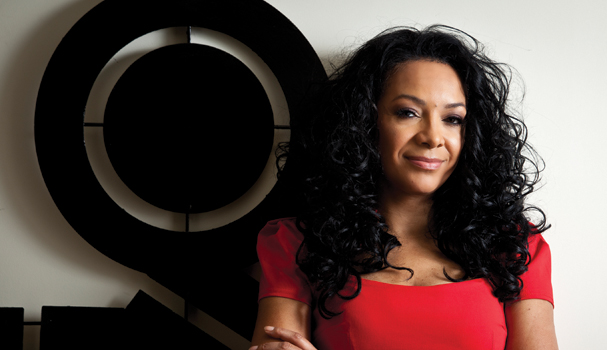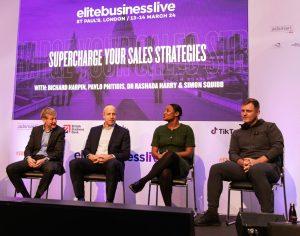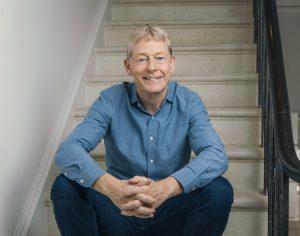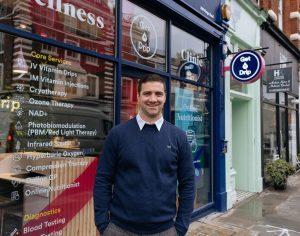The link between adversity and entrepreneurship is a well publicised one. The subject of many a press release, journal article and even books, it is almost embedded in the business psyche that a little hardship early on in life often spurs on an individual to strive for success and riches.
It’s certainly true to say Kanya King’s formative years were a bit of a struggle. For while the founder of the renowned Mobo awards is now responsible for a show beamed into the homes of 339 million people worldwide, it wasn’t always obvious that success would be within her grasp.
Growing up in council house in north-west London with her eight siblings, Irish mother and Ghanian father, times were tough. The youngest girl of her siblings (the name Kanya means ‘youngest one’ in Ghanian) she often found herself dressed in hand-me-downs. “They call these clothes ‘vintage’ now, but it didn’t seem very cool at the time,” she says.
What’s more, with 11 people under the roof of the small council house in Kilburn, it’s fair to say there wasn’t much in the way of personal space. “I think that’s why I got on the housing ladder at a young age – because there had been five of us in one room. It was a bit crowded,” explains King.
The entrepreneur found an outlet for her burgeoning creativity at school, where she excelled in English and art. “I did like school, and I always participated in everything that was happening,” she says. “I was quite sporty, too, and I was always good at long-distance running. So I think I learned early in life that I had a certain stamina,” King laughs.

Then when she was 13, the family was dealt a hammer blow when King’s father died. “I remember vividly the night he died because my mother and I went to the hospital – St Mary’s on Praed Street, near Paddington – and there were all of these tubes going into him. My mum wanted to talk to the doctor and she asked how long he had to live and the doctor couldn’t give her an answer; he said it could be a month or it could be five years. They didn’t know.
“As we left the hospital and we were walking along Praed Street, I just said to my mum, ‘Hold on a second’, and I had to rush back to the ward. I felt I hadn’t said goodbye to him. That was the last time I saw him because he died that night.”
Her father’s passing hit the family hard, and no one more so than his youngest daughter. She recalls an incident when her parents had briefly split up and she had felt torn between the two of them. “I hadn’t wanted to leave him on his own because the rest of the family were away, so I remember writing this letter to him. When he died, we found that letter. He’d held onto it all those years.”
She picked up her pen again to express her sadness at her father’s untimely passing. “I wrote a poem about how I felt and the school wanted to publish it,” she recalls. “But because it was so personal, I just couldn’t bear the thought of other people reading it. They said they’d change the name, but, still, I couldn’t do it.”
While it would have been easy to allow the turmoil to disrupt her schooling, King continued to apply herself. The importance of education had been drummed into her. “Education was very important to my parents. They had struggled when they came here at a young age. There would have been notices on the doors saying: ‘No blacks, no dogs, no Irish’. My mum found it very difficult with young children and trying to find somewhere to rent. It was very tough. And so my father had always instilled in me how important it was to work hard. He’d always taught me there was a bigger picture.”
But King’s teachers didn’t always share her father’s enthusiasm for her future. “I had these big ambitions of what I wanted to do – things like starting my own business – but I was told that my expectations were too high and I needed to be realistic,” she recalls. But she didn’t allow these doubters to dissuade her from dreaming big. “I had big ambitions of what I wanted to do because it had been a struggle growing up and I wanted to be financially independent.”
And financially independent is just what she became, buying her first home in Kilburn at just 17. This was no mean feat, especially as she’d given birth to a son, Jay, at the age of 16. When she was 18, she attended Goldsmith’s College in south-east London to study English and drama. It was a difficult balancing act. “I was juggling many different things. I was getting up early to work, going to university, working evenings and also looking after my son. It was tough.” So much so that in 1991 she nearly got thrown out for not attending enough lectures.
But King knuckled down and managed the near impossible task of balancing the myriad responsibilities of her life. Up until this point, she had been working in whatever jobs she could fit around childcare and university, from promotion work to market research. But of all the modules she’d studied at university, television had been what she’d enjoyed the most.
So, when someone she had met was doing a pilot for a television show, King mucked in, offering advice and ideas on the project. “She invited me to become part of the team, so it was a bit like my work experience,” says King. The show was picked up by Carlton, and King applied for a job at the station.
Meanwhile, King had her fingers in other pies. She’d maintained her music promotion work. “I’d always had so many things on the go and had been organising gigs because I had friends who were very talented musicians. Even though I didn’t have much money at the time, I just made it work. Often when you’re restricted with funds, you are more creative.”

As she held more events, it became more apparent to King that there was a shift in the music landscape as urban music soared in popularity. “There was an audience out there that wasn’t being catered for,” she says. “I could see that there were artists performing the kind of music that wasn’t being celebrated at the time and I had to do something about it. I hoped that this would inspire people to follow their own dreams musically, and their entrepreneurial ones too.”
At first, King was a little reticent about taking on such a momentous task. “But then I realised if I believed in something so much, I needed to put my money where my mouth was.” This isn’t to say it was an easy ride. “It was definitely very hard and it was very daunting because I didn’t have mentors; I didn’t have accountants or lawyers in the family. That business expertise didn’t exist.” In fact, her mother was convinced it was the wrong move to embark on such an ambitious project. “When I’d say I wanted to be an entrepreneur, my mother would give me 101 reasons why I shouldn’t, that I could lose my home etc. So I only told her once I’d already taken the plunge.”
King had been keen for many years to stage an awards ceremony for music of black origin – but had found the doors to be slammed in her face. This time, when she got the backing from Carlton, she had to move fast. “I remember when we were given the television slot, they said: ‘Do you want the good news or the bad news? The good news is we’re going to give you the TV slot. The bad news is the show needs to take place in six weeks.”
King describes that time as a “really intense period”. Overnight, she had gone from working out of her spare bedroom to needing to pull together a team, find premises, book acts and invite guests. It was a tall order. “It was daunting because I knew I had to prove myself. I knew I’d have to make it work.” Not least of all because she knew she’d only have one shot to to gain the trust of the urban music community. “They did it because they believed in the concept. They just needed to know it was professionally organised and would meet certain expectations.”
The first Mobo awards were held at London’s New Connaught Rooms in 1996 with Lionel Ritchie headlining and then-leader of the opposition Tony Blair and wife Cherie in the audience. “It felt like a landmark occasion,” says King. “Even though the music was seen as niche at the time, people were going going crazy for the awards. Here was a show that wasn’t on at 4am – it was on terrestrial TV at a decent hour.” And it wasn’t just the public that had got a taste for the project – the press was awash with stories about the upcoming show. “I think it was MTV who had its show a week later, which is a huge company, and here was us with this tiny budget generating equally as much coverage.”
The event was a huge success and the following year, it moved to the Royal Albert Hall. It has also been staged at other London landmark venues such as Alexandra Palace, Wembley and the O2. In 2009, for the first time, the Mobos left London to be set in Glasgow – a testament to King’s appetite to inspire, motivate and cultivate the culture of young people the length and breadth of Britain.
“We’ve always had a sense of cultural responsibility beyond the parameters of music and so we don’t go into a city without a clear purpose. It’s important to us to work with the communities in the cities we go to,” says King. This sense of local responsibility is one of the driving forces behind other events the company holds countrywide – from cinema nights to mobile talent competitions.
Mobo has also signed a three-year deal with tech brand HTC, with whom it holds a range of activities, including a mentoring scheme. “We’re jointly trying to support up and coming British talent,” says King.
The organisation’s employees may now number in the hundreds, but King is keen to keep the small-company feel. “I think the beauty of not being a large organisation is that we’re more nimble, we’re able to embrace new technology, and we’re able to constantly adapt the way we deliver our events and services.”

From working with as-yet-unknown artists to some of the biggest stars in the world, King keeps her feet firmly on the ground. For her, the biggest ‘pinch me’ moments haven’t been meeting her idols, but helping to cultivate the careers of some of the UK’s best talent. “I remember Amy Winehouse performing at our nominations launch before her debut album had come out. It makes you feel really proud that you’ve been able to contribute to artists’ careers and help music overall.”
That said, King was thrilled when her personal heroine Sade came out of retirement to perform at the Mobos in 2000 – the singer’s first performance in almost a decade. “I felt in awe really, she was absolutely amazing.” King has had become accustomed to spending time in illustrious company. “I was in the privileged position of celebrating Stevie Wonder’s birthday one year. Everyone started to clap when he arrived. Can you imagine the impact that had?” she exclaims. “He’s very funny and witty. I remember he rang me up one time and put on an English accent. He had me completely fooled.”
When not dining with international icons, King insists that she remains very grounded. As CEO, she continues to be very hands-on. She also still goes to a lot of gigs, as well as giving a substantial portion of her time to talks to aspiring entrepreneurs about founding their own businesses. “I’m passionate about SMEs,” she announces. “It’s all about helping support each other and helping other businesses to grow.”
When she does unwind, King spends time with her friends and family. She also enjoys the peace and tranquility of visiting London’s parks. “In my younger days, I used to spend a lot of time in the park. That’s where my mum used to find me,” she says. “I think coming from a large family, I loved the tranquility of sitting in deserted places, or quietly reading a book,” she explains. “Nothing’s really changed. If you can’t find me, take a walk to the park.” ![]()
Share via:


















































